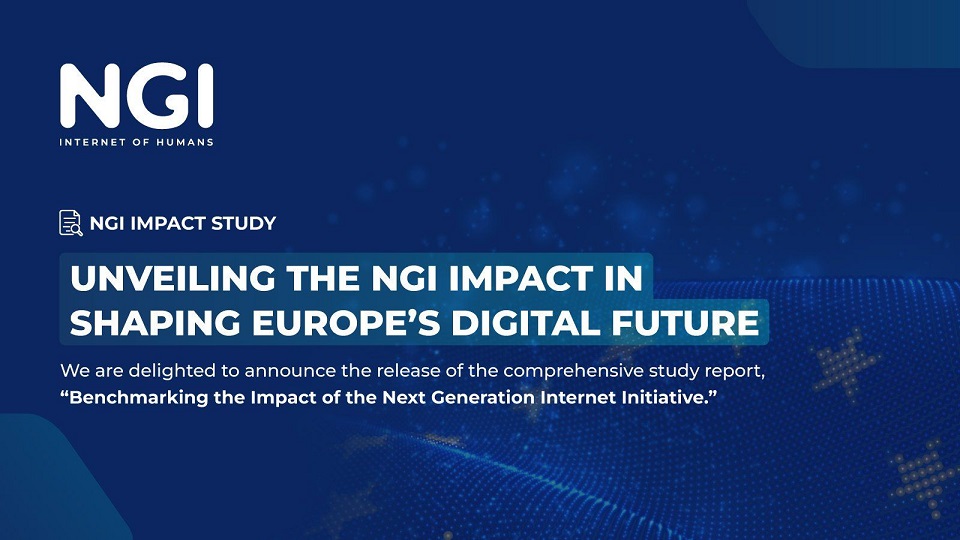European Commission’s report unveils impact of the Next Generation Internet initiative on Europe’s digital future

The European Commission’s Next Generation Internet (NGI) initiative announces the release of a comprehensive report on the impact of its funding programme, revealing significant progress in creating a more open, secure, and user-centric Internet aligned with European values.
The NGI program launched its support to Internet innovators in 2019. Since then NGI has been at the forefront of driving innovation with €140 million invested in over 1,000 open-source projects that prioritise European digital rights and principles.
Key findings of the Benchmarking the Impact of the Next Generation Internet Initiative report include:
- 57% of NGI-funded projects provide alternatives to existing market solutions, challenging industry giants and bolstering EU digital sovereignty.
- 74% of projects successfully follow through after the first NGI funding. Post-funding, NGI projects continue to operate, showcasing their sustainability. Additionally, 32% of the projects have secured renewed or additional funding.
- 76% of NGI projects have an active community, indicating a significant level of reuse, with an estimated 80,000-strong ecosystem of contributors, individuals actively supporting NGI projects through code, testing, and bug reporting.
- NGI funded solutions are widely accessible through public repositories (84%), distribution platforms and app stores (34%) or both (29%), which drives their re-use/usage.
- NGI projects demonstrate a strong degree of impact on enabling different EU legislations, with a focus on supporting GDPR compliance (39%), the Digital Services Act (DSA) and Digital Market Act (DMA) (23%), the Cyber Resilience Act (30%), EU digital identity initiatives (15%), ensuring freedom of choice online (47%), and supporting the concept of digital commons (44%).
These findings highlight the broad impact of the NGI initiative across various domains, from technical standards to economic impact. They also underscore NGI’s role in fostering innovation, sustainability, and collaboration in the digital sphere.
The report also includes a qualitative analysis describing approximately 100 impactful NGI solutions covering 11 technology areas (network and transport, decentralised social media, Web 3.0 and cryptography, internet tools’ evolution, instant messaging, identity and digital signatures, open hardware, collaborative tools, crowdsourced data and AI, virtual worlds/Web 4.0 and the software supply chain) and how they are drivers for change, mainly in terms of usage and uptake but also how they drive standardisation initiatives.
Here are a few success stories across various technological domains:
- The Fediverse, a decentralised social media network, boasts 3.2 million active users across 19,000 instances, demonstrating the growing appetite for privacy-respecting alternatives to mainstream platforms.
- In open hardware, KiCad, an NGI-funded electronics design suite, is used in over 40% of designs going into production at some Printed Circuit Boards factories, showcasing its industry adoption.
- NGI support has enhanced privacy in instant messaging by developing end-to-end encryption, implemented in projects like Conversations and Movim.
- In cryptography, the oqs-provider project integrates post-quantum algorithms into OpenSSL, preparing for future cybersecurity challenges.
- CryptPad, an end-to-end encrypted office suite, has been adopted by many organisations, including the German governmental openDesk initiative.
About the report
This report was produced by Gartner Consulting for the European Commission’s Directorate-General for Communications Networks, Content and Technology. The study employed a two-step methodology: first, a quantitative analysis based on a survey of NGI-funded projects, and second, a qualitative analysis focusing on approximately 100 high-impact projects across various technology clusters.
Explore the full report
Access the NGI Impact Report [here].
Note: The reuse policy of European Commission documents is implemented by Commission Decision 2011/833/EU of 12 December 2011 on the reuse of Commission documents (OJ L 330, 14.12.2011, p. 39). Unless otherwise noted, the reuse of this document is authorised under a Creative Commons Attribution 4.0 International (CC BY 4.0) licence (https://creativecommons.org/licenses/by/4.0/). This means that reuse is allowed provided appropriate credit is given and any changes are indicated.
About NGI
The Next Generation Internet initiative is an EU-funded programme dedicated to advancing a human-centric internet aligned with European values. Since its inception, NGI has supported over 1,000 open-source projects, fostering innovation and strengthening Europe’s digital infrastructure with an investment of €140 million.












